- Home
- John Barth
Chimera Page 10
Chimera Read online
Page 10
“But it’s all exposition! Where’s the real-time drama? Where’s the climax?”
Calyxa smiled seriously. “I think we’ll come to it very soon. Together.”
“Hmp.”
You sound like her; please don’t be critical. The evening was, I sensed: for one thing, Calyxa announced then, at first augustly, that next day, the ninth since the sun’s entry into Leo, was the twenty-fifth anniversary of her birth and the twentieth of another red-letter day on the calendar of her life, which she’d tell me about tomorrow. By way of celebration, it being presently by her estimate an hour or so from midnight, she suggested we reverse our usual order and enjoy narration before copulation, so that she might arrive at the quarter-century mark in my arms. I was much touched—and troubled by another implication of her news—but I observed to her that the gloss on II-F-1 would be malapropos and anaphrodisiac in those circumstances, since, as she knew, that morning’s scene had represented my tryst with Medusa. Should we not just skip it? Game of backgammon? Hour’s nap?
“No,” Calyxa said positively. “I’m okay now. I want to hear it.”
“Okay, I guess she is okay. I’m still jealous, but I won’t be critical any more.”
Good. She was okay, certainly, that night, as I told the tale. I hope she’s okay now. “It was in the morning,” I told her, “Medusa told me she was Medusa. We’d tried again, not a whole lot better; she’d drawn up hind-to to me—please don’t turn over—still wearing the kibisis alone, and bade me not turn her over till she’d told her tale. First came the story of her life, part of which she’d exposed to me in Samos: her pretty girlhood, Poseidon’s rape, Athene’s punishment, her ignorance of her Gorgonhood and mistaking me for her lover instead of her destroyer.” Very difficult to tell this part, especially with you listening.
“But do, please. You owe it to me.”
Very well: “Her eyes had been opened, she told me, by my sword at her neck, and her last sight had been her reflection in my shield—the same she’d set her hair by in Athene’s temple. It so mortified her she was pleased to die; she knew no more until Athene had scalped, rebodied, and revived her—whereupon her first request was to re-die at once if she was Gorgon still. An odd thing was that, once brought back, she could recall all her dead head’s doings, and did so with mixed feelings. To be perfectly frank, despite my having killed her she still loved me, and had lived, during her death, for those moments when I raised her by the hair and she withered my enemies with a glance. This declaration moved me; I begged her to unbag and let me kiss the pretty head—she had said it was pretty?—I’d so ill-used to such good effect in its former state.
“But she stayed my hand with a recital of the hard conditions of Athene’s amnesty: first, should she ever again look at her reflected image, she’d see a Gorgon, not a girl; second, should she show her face to anyone, she’d instantly return to Gorgonhood.”
“That’s not fair,” Calyxa said. “For all she could tell—”
“Exactly. But there was one compensation and one escape-clause. Athene granted her the power to juvenate or depetrify, just once, whomever she gazed uncowled at or whoever uncowled and gazed at her; but the conferral of this boon on the beholder must be at her own cost, since by the earlier stipulation she’d be reGorgoned.”
“Ay,” Calyxa said. “Your sister doesn’t give anything away free.”
“She’s not the goddess of justice. I asked Medusa what the escape-clause was, but for a time she wouldn’t say. I believe I mentioned she was shy; what I’ve told here in two pages took me days to coax from her. Between confessions—which I prompted by confiding my own troubles, at an exchange rate of seven to one—we strolled the beach, swam and fished, talked about life in general.”
“And made love,” Calyxa said.
“And tried to make love. She was pleased enough; Poseidon, that time in the temple, had been rough on her; you know how gods are.” “Yup.” “Nobody’d ever done the forepleasures with her properly, or showed her what to do with herself…”
“I promise not to say anything critical,” Calyxa said. “I kind of like Medusa now. But I thought most of those things were instinctive.” “Nope.” “Well… hadn’t she read anything? You know.”
“Reading was what she did most,” I replied, “especially the old myths and legends; it was what we mainly talked about. However, as you may have noticed, myth isn’t reality: it was agreeable to teach her how love is made, but her inexperience was as off-putting in its way as your expertise. What’s more, I was naturally concerned over Athene’s stipulations, as I learned them…”
“In short, you were impotent, like with me a few days ago.” “Yes.” “Not the whole time, I hope? I’m on Medusa’s side now.”
“Did she really say that, Perseus?”
She really did. “Just the first few times,” I answered. “We got a bit better each night, just like us. It turned out she was afraid I wouldn’t want her when I learned she’d been a Gorgon, and been raped by Poseidon, and given birth to Pegasus.” “Hear me not saying anything?” “But I told her, honestly, that those things didn’t bother me at all. The fact was—no other way to say it in a first-person narrative—Medusa really loved me, her first experience of that emotion, and I realized I hadn’t been loved since the old days with Andromeda. What’s more, she truly was a kindred spirit; we had jolly conversations…”
“Don’t beat about the bush,” Calyxa said. “Did you love her or not?”
I answered, forgive me, I was plagued by doubts about us both. “How could I be sure what was behind her veil?” I answered. “And wasn’t it likely my attraction was mainly relief after all my troubles, or mere vanity at being loved?”
“What you really wanted,” Calyxa said, “was to be twenty with Andromeda again. Can we get to the escape-clause?”
I was astounded by her insight. “That’s what we got to, on the fifth night. We’d finally had a proper love-making; she’d learned to let herself go a little, even felt her first bit of orgasm; it was clear we’d be all right soon enough if we kept at it, just as we’d be; while we clung together in the dénouement, I declared I loved her and asked what Athene’s last condition was, for I wanted very much to see the face that spoke in such a gentle voice and topped such a pretty neck, excuse me.” Excuse me. “At last she got it out: if the man who uncowled her, and on whom she laid her one-shot grace, were her true lover, the two of them would turn ageless as the stars and be together forever. But since she hadn’t known herself a Gorgon before, and couldn’t view herself now, for all she or I could know she might be Gorgon still, and Athene’s restoration a nasty trick. In short, whoever unveiled and kissed her must do so open-eyed, prepared to risk petrifaction forever in a Gorgon’s hug. ‘I’m willing, Perseus,’ she told me at the last, ‘but you’d better think it over.’ “
Calyxa shook her head. “I can’t remember any analogues for that motif.”
“I couldn’t either. Next day she was quieter than usual, and that evening she told me very gently just what you said a while ago: in effect, that I loved her less than she me, and was still bound with half my heart to Andromeda. I wished then I’d had a kibisis for myself, to hide my shame; I swore I did love her, if anyone, as much as I could, not really knowing her and all—”
“O boy, Perseus.”
“Yes, well. She wept a bit, near as I could tell; I was all cut up, yet at the same time stirred; lots of sex in this story: I touched her; she flowed at once, most womanly; I managed almost as well as with Andromeda. Medusa was in rapture; I don’t say this out of vanity…”
“I know why you say it,” Calyxa said. “But how about you, Perseus? Were you in rapture? I think about us, last night, on the very edge…”
I told her, what was true in the other case as well, I was still too preoccupied to feel rapture of the kind I’d been accustomed to with Andromeda in better days. Pleasure, yes, and some satisfaction, but as yet no rapture, quite, of the free transporting so
rt, nor would I likely, until we rose unfettered to the same high altitudes.
“If ever.”
I shrugged. “In any case, Medusa came at last; there was the moment to discover her.” “Yes.”
“Yes.”
Yes. “But I didn’t, merely held her fast until I fell asleep. Next morning she was gone; I woke alone…” “Perseus?” “Yes?” “It’s after midnight. I’m twenty-five and scared. Will you make love to me?”
I did; she did; there is a surfeit of sex in the story; no help for it; we verged on much and didn’t cross the verge. No more my merry priestess, Calyxa solemnly sat up and by the light of the altar-lamp watched me drip from her to the spiraled spread.
“I like my life,” she said, as if addressing the little puddle. “I come and go as I please. It’s a free, independent life. I wouldn’t be tied down to any man. You and I don’t really relate. I can’t turn you on. We’d probably drive each other crazy if we stayed together. You’re not in heaven, Perseus. Neither of us is.”
One finger was permitted to touch her thigh. “Chemmis?”
She nodded.
“And alive, then.” “Yes.” Pause. “I wondered how it was you could have a birthday.”
Pause. We both watched her flex to stop my flow from her, in vain for all her able musculature. “When you stopped here on your way to Joppa the first time, it was my fifth birthday,” she said. “They let us out of summer kindergarten to see the gold-skinned flying hero who’d cut off the Gorgon’s head. You only took a drink of water from the public fountain and flew off, but all through school we studied you and the other Greek heroes, along with Ammon and Sabazius and our native ones.” She sat cross-legged on the spermy point, her tears running too. “I could stop this if I closed my eyes and legs,” she declared, and didn’t. “At first the town council put a little bronze plaque on the water fountain; Ammon and Sabazius were local favorites. Later on, when I thought I might like to be a scholar, I wrote a thesis on the three of you: my heroes.” She smiled, sniffed, fingered the pudlet. “In fact, that was my thesis: that since of the local heroes only Perseus was technically a hero, and a first-rank one at that, whereas the others were technically gods, but secondary ones, you were as deserving of a temple as they were. It was a stupid essay.”
“I don’t know.”
She shook her head. “I can’t do scholarship. Or write or draw or anything. I’ve got this great IQ and I can’t do anything. I’d been working in Ammon’s and Sabazius’s temples to support my studies, and then Ammon screwed me, and I liked it, so I let Sabazius in too, and pretty soon I was in charge of all three temples. It’s not bad work; I meet a lot of people; I just wonder sometimes if I’m getting anywhere that matters. The three of you are married; Ammon and Sabazius have loads of other girlfriends. In a way, I guess, you were my last hope; when Medusa brought you here, I couldn’t help wishing…” Idly she flicked semen at the lamp-flame. Missed. “So it turns out even you’ve got a girl already.”
“Not any more,” I said. “Not even I.” But I did, if I was alive, have a wife (I regarded her—young, naked, and lovely, chained to the cliff in I-F-3), to whom I’d better be getting back. “I wondered why Chemmis was the only scene missing. So tomorrow’s mural—”
“Just the desert, as you’ll see on your way out. But Perseus…” Surprisingly, for I thought her vexed, or self-sorrowing, or both, she slid over and put my head in her lap. “I might as well be the bastard who breaks the news: Andromeda’s left you. For keeps.”
I’d been enjoying close-up her lamplit navel. At this announcement my heart skipped as in poor poetry, and my eyes closed without my closing them.
“Medusa told me when she fetched you from the desert,” Calyxa said. “You’re wife’s gone on to Joppa with Danaus.”
I unlapped and found my missing voice. “I’ll kill him.”
But Calyxa observed, calmly, that killing Danaus would change nothing; he meant no more to Andromeda than she Calyxa me: a mere diversion, a refreshment. Andromeda wanted rid of me, and that was that; if I examined my heart, I must see that I was finished with her as well. Such things happened. Wasn’t that the case?
I spoke with difficulty, into her stomach. “I suppose.” Now my eyes were wet as well.
“Do you love Medusa?”
“I don’t know.”
Calyxa rubbed two fingertips in closing circles where gold curls formerly grew. “If you wanted to stay on here… I mean indefinitely… I’d like that.”
We spent a sweet half-hour; then she slept imperiously as a child while I tossed the night through, galed by emotions sundry as the II-B winds. The image of Danaus abed with Andromeda one moment made me retch and sweat with rage; the next I was euphoric with relief to be at last unchained, free to be Perseus, starred or stoned as the issue might prove, but my own man. Followed grief at the lost past, my one young-manhood; then sympathy sharp as pain for my Andromeda, mine no more—so fine and dainty in the bed still (rerage at young Danaus! fresh fury!), unbearable as myself every other where. Toward dawn I went round with the guttery lamp, reviewing for the last time the first revolution of my story; lamp-oil, night, and heroic youth ran out together; I came back to Calyxa, stroked her out of dreams into drowsy liquefaction, here it comes again, climbed with her to our first full fillment. She held my face close for examination while we finished pulsing.
“I was sure you’d gone.”
When I didn’t answer she held fast yet a moment, blinked once, then let go all and turned her face away.
“I may be back,” I said. Further: “Thanks an awful lot, Calyxa. For everything.” I might even have gone on to say, “I really mean it,” had not a throat-lump spared her that final gaucherie. A tunic, prose-purple, hung in the passage behind I-A; I donned it, left my priestess leaking love, and tiptoed out, pausing just a moment at her final sketch (not yet graven), the second panelet of II-F. She’d blocked across it as on a billboard PERSEUS LOVES—––-, a slight inaccuracy. A few early tourists approached from the vast blank spaces which in time would be II-F-3 through 7 and II-G. Not having entered my story yet, they didn’t recognize its hero; and I (I recognized an hour later, dhowing down the pea-green Nile) neglected in turn to notice whether any man among them looked deserving of its artful chronicler, and my gentle, cosmic jealousy.
“Do you still feel that way?”
I shall eternally; can’t help it. Sorry.
“I didn’t ask you to apologize.”
I shall eternally; can’t help it.
“Joppa period,” I told the boatman, who proposed a Memphis rest-stop and a tour of the river’s seven mouths. On the beach at Pharos like a bearded beacon stood the Old Man of the Sea, but I had no need of navigation-aid: oriented, by falling-starlight I surely steered us east. Two-thirds of my tale was told, its whence and where; as to its whither, I knew only that I would once more and finally confront Andromeda: whether to kiss or kill, hello goodbye, her whomever, I’d known when I was II-F-3’d. Calyxa was behind; I assumed I was bereft of New Medusa too, despite her having yet again saved my life, since love and gratitude, in the clutch, had been kibisised by doubt. Don’t say it, I’m not apologizing, I told myself it was just as well: let my second tale be truly a second, not mere replication of my first; let a spell of monologue precede new dialogue…
“Okay. I’ll say no more.”
Not till the epilogue; may its hour hasten. My scruffy boatman, next morning when we landfell Joppa, pointed out the cliff where fair Andromeda had been snacked for Cetus till mighty Perseus et cetera. She wasn’t fair, I corrected him. One in every boatload, he rejoined, I having paid him in advance for the night’s journey: had I been there, as he had? To preserve my anonymity I let the seedy salt run on; even when he described, in lewdest terms, my bride-to-be’s nakedness, to ogle which he claimed had been my motive for going down, I didn’t dagger him—only vowed to post Calyxa this further hair-thing in my history, thitherto forgot: how I’d thought Andromeda a marb
le statue till the sea breeze stirred her hair. The seaman mistook my smile for smirk and reported what he said was coastwise knowledge: that that same Andromeda was currently whoring it in Joppa with a new boyfriend; that one Galanthis, said to be Cassiopeia’s gigolo, was out to hump her as well; that the elder queen was so smote with jealousy she’d hecatombed Ammon to send another Cetus, which remonstration would permit her to re-sacrifice her roundheel daughter; that—but that that was the last he thatted: passivity be damned, I dirked and sharked him, dhowed to port alone.
That day I prowled the town in hopes of reconnoiter, hooded like my desert darling—till I recollected her advice, near on to evening. I doffed my mantle then, went straight to the palace gate, told the dusky guard I was King Perseus, out of my way, strode into the court, where I sat on the nearest bench to let come what would. Came, from behind the hedge behind me where old Cepheus grew his greens, his antique voice, I knew it.
“Good evening, good evening, I believe. I presume there’s someone there? Eyes and ears aren’t what they used to be…”
I went through the hedge. “It’s I, old man.” Much shrunk with years, Cepheus sat on the vegetable ground, not addressing me after all, but as it were the sprouts themselves, and went on as if I weren’t beside him.
“Seems to me I’ve been here forever. I make a kind of circuit of our fields, I guess; rotate like my crops; after a while one’s much like another. Pity, that. Caught me nap—”
I’d tapped his shoulder.
“I was about to say,” he said, “you caught me napping, as one night Perseus will…”

 Final Fridays
Final Fridays Where Three Roads Meet: Novellas
Where Three Roads Meet: Novellas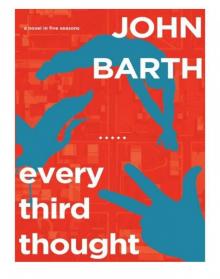 Every Third Thought: A Novel in Five Seasons
Every Third Thought: A Novel in Five Seasons The Sot-Weed Factor
The Sot-Weed Factor The Friday Book
The Friday Book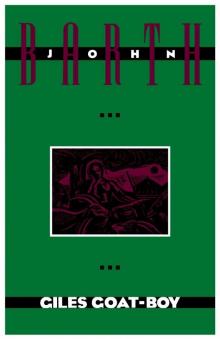 Giles Goat Boy
Giles Goat Boy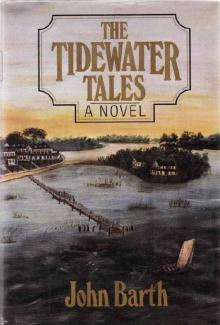 The Tidewater Tales
The Tidewater Tales The Development
The Development The Floating Opera
The Floating Opera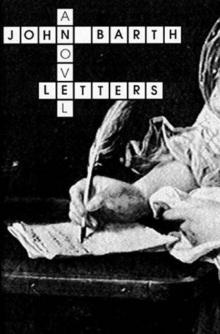 Letters
Letters Chimera
Chimera Where Three Roads Meet
Where Three Roads Meet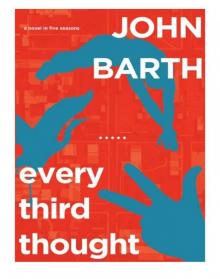 Every Third Thought
Every Third Thought